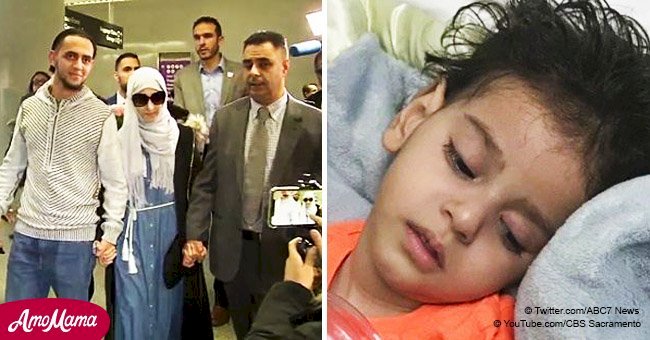
Yemeni mom finally arrives in San Francisco to say goodbye to her dying 2-year-old son
A Yemeni mother was able to hold her dying son for the last time thanks to a travel ban waiver.
Shaima Swileh had been trying for a year to fight the travel ban imposed by President Donald Trump on her country. Her two-year-old has a rare genetic brain disorder and is dying.
On Tuesday, Swileh and her husband Ali Hassan finally overcame the legal battle via the Council on America-Islamic Relations. The Guardian reported that the mother arrived at the San Francisco international airport on Wednesday evening.
Follow us on Twitter for more @amomama.
She wore dark sunglasses, a white headscarf, and a black outfit. Supporters and the media swarmed around her. She made her way to Oakland's UCSF Benioff Children's Hospital to see her son.
By Thursday, the council confirmed that, after 17 months, Swileh had gotten to hold her boy. She cradled his small hands and rubbed against his face. The tubes in her son as he lay dying did not deter a mother's love.
The win is a big one for the family after the Trump administration imposed a travel ban on several Muslim-majority countries in June 2017. Yemen, Iran, Libya, Somalia, and Syria are among them.
Just two percent of waiver applicants are successful in their petition for a visa to go to the United States. Justified reasons include preventing undue hardship, being in the national interest, and not posing a security risk.
The waivers are considered on a case-by-case basis. In this case, Hassan is a US citizen who brought his son to the US in October last year for treatment.
In a news conference earlier this week, he tearfully exclaimed:
"My wife is calling me every day wanting to kiss and hold her son for the one last time."
Following the waiver grant, Hassan said that it would "allow us to mourn with dignity."
Hassan's grandfather also spoke on the matter, saying that his daughter was crying every day. He told the San Francisco Chronicle:
"To hold him for at least a minute. She's not going to see him forever."
The Council on American-Islamic Relations was compelled to sue authorities soon after Hassan began considering taking his son off life support.
When his wife finally arrived, he said at the airport:
"This is a difficult time for our family, but we are blessed to be together."
Swileh's visa will further allow her to stay in the country for long enough to work on citizenship.
Meanwhile, a Yemeni-American man who had been living in the US for decades was faced with the travel ban when he wanted to have his family join him.
Nageeb Alomari had a wife and three daughters in Yemen. As the war got more intense there, he attempted to bring them across, but that was when the Trump administration imposed the ban.
One of Alomari's daughters has severe cerebral palsy. However, in May 2018, he was able to successfully use the waiver application to get his family home.
Many believe that the waiver was granted due to public recognition. This would imply that the process is not being carried out correctly for less visible applicants.
As time goes on, we hope such situations can be done in such a way that both parties are able to see benefits to such far-reaching decisions.
